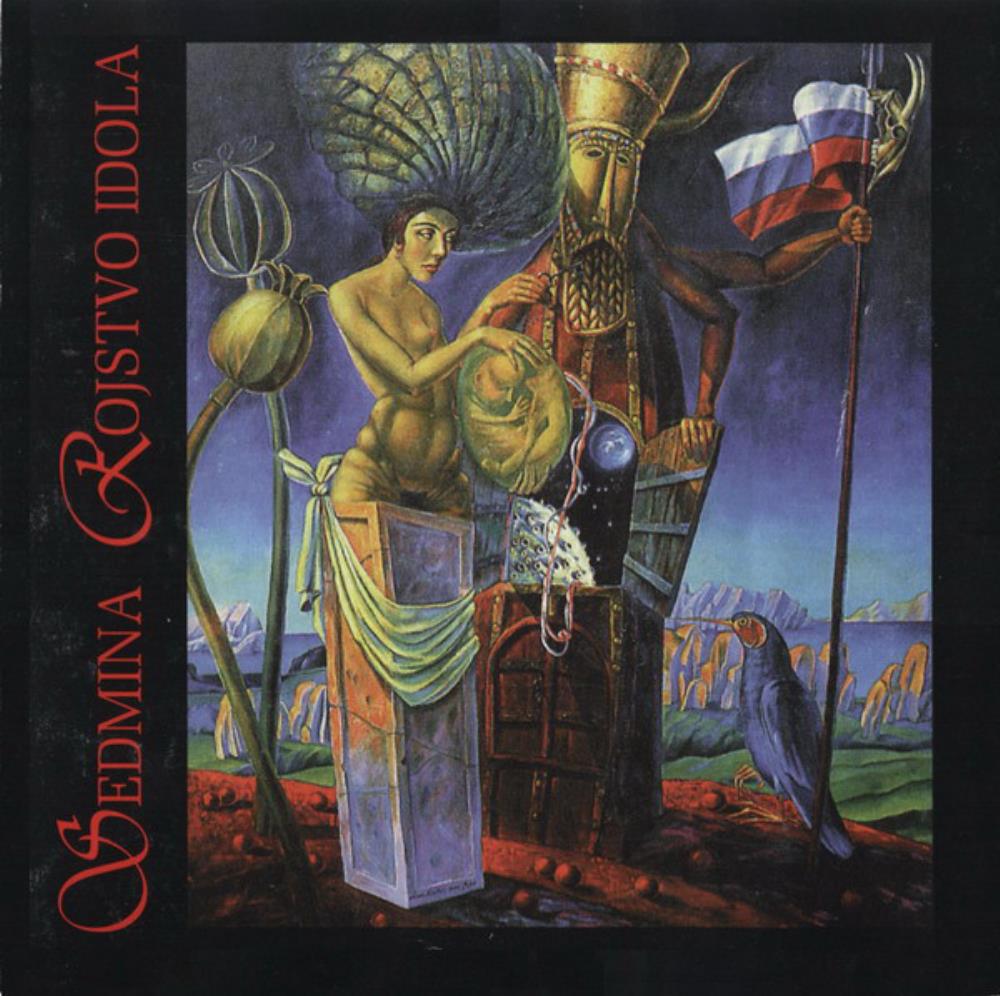
|
ROJSTVO IDOLASedminaProg Folk |
From Progarchives.com, the ultimate progressive rock music website
 "The Birth of Idols" as the title translates in English has a bit of history. Original line-up
of SEDMINA disbanded after the second album "II dejanje", with Melita Osojnik
continuing as a solo artist and Veno Dolenc forming soon another group called DUMA.
Here he invited a new sophisticated female vocalist, Klarisa Jovanovic to replace Melita.
Another important contributor to this album was Boris Kovac. He is a multimedia artist
from Novi Sad (during the 1980s he led an experimental ensemble RITUAL NOVA,
combining classical, jazz, traditional and rock music), who had co-written most of the
songs with Dolenc, played flute, saxophone, keyboards and acted as arranger and
producer. Along came the legion of session musicians playing an assortment of
traditional and rare instruments (double bass, percussion, brac tambura, viola, cello,
harmonium, choir vocals...), thus creating a collection of wonderful songs. This was to
be released on cassette only, under the artist's name DUMA in summer 1993, by ZKP
RTV Slovenija label in a modest circulation. Finally, during the 1990s, Dolenc and
Jovanovic revived SEDMINA, and after the album "Onkraj reke" recorded in 1997,
decided to re-issue the old DUMA material, this time digitally re-mastered under
SEDMINA tag.
"The Birth of Idols" as the title translates in English has a bit of history. Original line-up
of SEDMINA disbanded after the second album "II dejanje", with Melita Osojnik
continuing as a solo artist and Veno Dolenc forming soon another group called DUMA.
Here he invited a new sophisticated female vocalist, Klarisa Jovanovic to replace Melita.
Another important contributor to this album was Boris Kovac. He is a multimedia artist
from Novi Sad (during the 1980s he led an experimental ensemble RITUAL NOVA,
combining classical, jazz, traditional and rock music), who had co-written most of the
songs with Dolenc, played flute, saxophone, keyboards and acted as arranger and
producer. Along came the legion of session musicians playing an assortment of
traditional and rare instruments (double bass, percussion, brac tambura, viola, cello,
harmonium, choir vocals...), thus creating a collection of wonderful songs. This was to
be released on cassette only, under the artist's name DUMA in summer 1993, by ZKP
RTV Slovenija label in a modest circulation. Finally, during the 1990s, Dolenc and
Jovanovic revived SEDMINA, and after the album "Onkraj reke" recorded in 1997,
decided to re-issue the old DUMA material, this time digitally re-mastered under
SEDMINA tag.Music on "Rojstvo idola" is basically arranged upon the lyrical poetry of Veno Dolenc, historic Slovene poet France Preseren and French author Francois Villon. Musical structure consists of elements from mediaeval, Renaissance, alternative rock expression and traditional folk music of Central-South-eastern Europe. Material was recorded in a church; hence a sacral, quite dark and "Gothic" feeling is present throughout the record. Although Melita's soprano vocal was a distinguished mark of the first two albums, Klarisa's somewhat lower voice which bears an archaic, eerie chant- like sensation, is equally stunning.
Dark, acoustic elegies like "Ptica" ("The Bird"), "Balada o obesencih" ("Ballad of the Hanging Ones") and "Druidi" ("The Druids"), are masterpieces of highly intimate, passionate and devoted songwriting, with almost metaphysical experience. Containing minor-key vocal harmonies, symphonic/baroque passages and reciting the Bible excerpts ("Our Father") in what sounds like Old Church Slavonic liturgical language, these pieces invoke an early 1970s folk-psychedelia of German acts like AMON DUUL II and BROESELMACHINE or British ones like INCREDIBLE STRING BAND, mixed with mid- 1980s darkwave champions DEAD CAN DANCE. In contrast, "Zapuscena" ("The Untidy Woman") and a traditional cover "Igraj v kolu, Jabolko" ("Do the Dance, My Apple") bring a relaxed atmosphere made by acoustic guitars, light percussion and strings with beautiful voices of Klarisa and Veno.
This album is a perfect piece of art and the ultimate progressive acoustic folk record, which ranks among the very best albums of the genre ever recorded in all countries of the former Yugoslavia, and is a pure masterpiece without a single weak moment.
 As an ethnic folk album the music of ‘Rojstvo idola’ is generally emotive, well-crafted and fundamentally not much of a departure
from their previous releases. From a progressive music perspective however, the fourth Sedmina album is a bit of a step
backwards.
As an ethnic folk album the music of ‘Rojstvo idola’ is generally emotive, well-crafted and fundamentally not much of a departure
from their previous releases. From a progressive music perspective however, the fourth Sedmina album is a bit of a step
backwards. The lineup here is largely the same as on the previous ‘Onkraj Reke’, and is centered around the husband-wife pair of Veno Dolenc and Klarisa Jovanoviæ. On their third album there seemed to be a more distinct separation of the vocal duties between the two of them, and there were as many solo performances as duets. Here this seems a little less pronounced, with Jovanoviæ leaning more to a complementing role backing her husband.
The tracks here are much less distinctive than on previous works of the group, most of them being very slow, moody, almost glum in many places. There are a few interesting exceptions, most notable “Druidi” with its complex blending of Mediterranean, Celtic and southwest Asian rhythms and instrumentation. The traditional folk tune “Igraj v kolu, jabolko” gets a decent treatment, but like the band’s third album one of my complaints is that they just don’t seem to take full advantage of the vast array of instruments and musicians at their disposal in the studio. Besides the vocals you can hear acoustic guitar, woodwinds (mostly flute), and also some clarinet. The strings are quite muted throughout, and the addition of a cello is a great opportunity lost as its not used to full effect anywhere really, except on the opening “Zapuščena” and “Druidi”.
A couple tracks (particularly the wandering and unfocused “Ptica”) seem to lumber along spreading a cloud of gloom in their wake but without any redeeming hope or humor. That track especially in the middle of the album really seems to bring it down to a place where there is no real recovery.
These are a collection of earlier recordings, and I believe most of them were actually recorded earlier than those on the previous release ‘Onkraj Reke’, which itself was a collection of tracks recorded several years before their release. These on the other hand were released on cassette under the band name Duma, and I believe represent the first published works of Dolenc and his then-new bride Klarisa Jovanoviæ. I can say with confidence they got better.
This is not a bad album, but the bar for these guys should be kept high and this one album doesn’t quite rise to that level. This one is definitely for collectors, and probably of some interest to most prog folk fans, but I wouldn’t go too far out my way to find it. Since it has value and interest beyond just collectors I’ll give it three stars, and recommended for Sedmina fans and for the curious.
peace
SEDMINA Rojstvo Idola ratings only
chronological order | showing rating only
Post a review of SEDMINA Rojstvo Idola
You must be a forum member to post a review, please register here if you are not.
MEMBERS LOGIN ZONE
As a registered member (register here if not), you can post rating/reviews (& edit later), comments reviews and submit new albums.
You are not logged, please complete authentication before continuing (use forum credentials).





 |
|